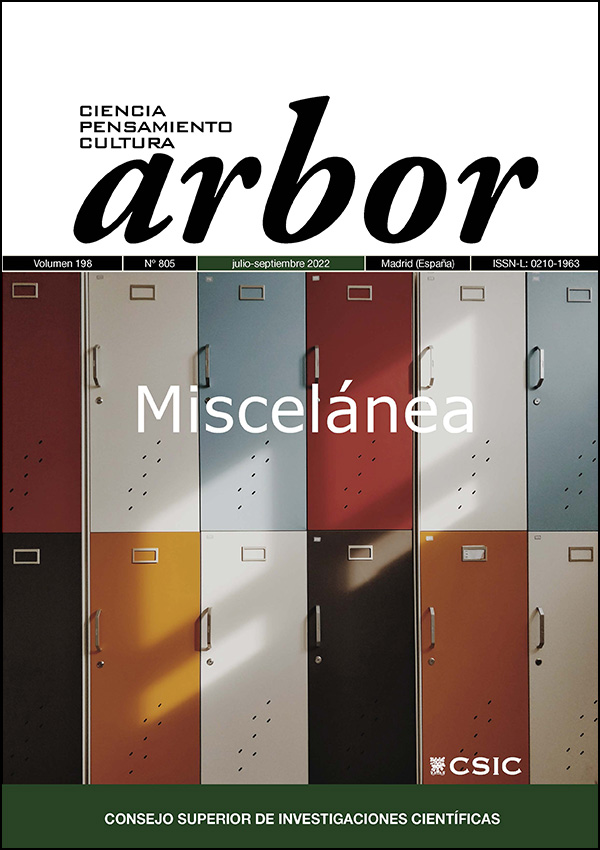Against the gospel of development, or why reread Ivan Illich
DOI:
https://doi.org/10.3989/arbor.2022.805001Keywords:
Industrial society, gospel of development, humanistic approach, degrowthAbstract
The history of development is closely tied to need in today’s world. Criticism of this link has grown in recent years, but perhaps it is Ivan Illich who made the most profound criticism in what he called an epilogue to post-industrial society. Illich’s proposal, scattered throughout nearly all his work, implies taking need as a humanistic or philosophical concept: neither economics nor psychology can exhaust the meaning of need. This paper tries to re-contextualize Illich’s thinking for the present, as it has been taken as a basis for social and political movements such as anti-consumerism (satisfaction of needs) or degrowth groups (against all kinds of economic development). In short, Illich can be considered a heretic against the gospel of development.
Downloads
References
Agamben, Giorgio (2005). Profanaciones. Barcelona: Anagrama.
Avanessian, Armen (2021). Meta-futuros. Perspectivas especulativas para el mundo que viene. Barcelona: Holobionte.
Bachelard, Gaston (2005). El agua y los sueños: ensayo sobre la imaginación de la materia (vol. 18). México: Fondo de Cultura Económica.
Bastani, Aaron (2019). Fully automated luxury communism. Londres: Verso Books.
Bauman, Zigmut (2013). La cultura en el consumo de la modernidad líquida. México: Fondo de Cultura Económica.
Bookchin, Murray (1974).El anarquismo en la sociedad de consumo. Barcelona: Kairós.
Brundtland, Gro Harlem (1987). Our common future-Call for action. Environmental Conservation, 14 (4): 291-294. https://doi.org/10.1017/S0376892900016805
Bury, John (1971). La idea del progreso. Madrid: Alianza.
Certeau, Michel de (1996). La invención de lo cotidiano: artes de hacer I (vol. 1). México: Universidad Iberoamericana.
Corominas, Joan (1985) Diccionario Crítico Etimológico Castellano e Hispánico. Madrid: Gredos.
Esposito, Roberto (2013).Comunidad, inmunidad y biopolítica. Barcelona: Herder Editorial. https://doi.org/10.2307/j.ctvt9k1hn
Esteva, Gustavo (2010). What is development? Oxford Research Encyclopedia of International Studies. Oxford: Oxford University Press.
Fromm, Erich (2013). ¿Tener o ser? México: Fondo de Cultura Económica.
Hamsun, Knut (2004). Hambre. Madrid: Ediciones de la Torre.
Illich, Ivan (1993). H2O y las aguas del olvido: reflexiones sobre la historicidad de la "materia", aquello de lo que las cosas están hechas. México: Editorial Joaquín Mortiz.
Illich, Ivan (2006). Obras reunidas/Collected Works (vol. I). México: Fondo de Cultura Económica.
Illich, Ivan (2008). Obras reunidas/Collected Works (vol. II). México: Fondo de Cultura Económica.
Kothari, Ashih, Salleh, Ariel, Escobar, Arturo, Demaria, Federico y Acosta, Alberto (coords.) (2019).Pluriverso.Un diccionario del posdesarrollo. Barcelona: Icaria.
Land, Nick (2018). Fanged Noumena: Collected Writings 1987-2007. Falmouth: Urbanomic/Sequence Press.
Latouche, Sergé (2008). La apuesta por el decrecimiento: ¿cómo salir del imaginario dominante? Barcelona: Icaria Editorial.
Latour, Bruno (2017). Facing Gaia. Eight Lectures on the New Climatic Regime. Londres: John Wiley & Sons.
Leiss, William (1988). Limits to Satisfaction: an essay on the problem of needs and commodities. Montreal: McGill-Queen's Press.
Marcuse, Herbert (1993). El hombre unidimensional. Barcelona: Planeta-Agostini.
Maslow, Abraham (1991). Motivación y personalidad. Madrid: Ediciones Díaz de Santos.
Meadows, Dennis y Randers, Jorgen (2012). The limits to growth: the 30-year update. Londres: Routledge. https://doi.org/10.4324/9781849775861
Meadows, Dennis y Randers, Jorgen (2013). The Limits to Growth. En Libby Robin Sverker Sörlin y Paul Warde (eds.). The Future of Nature. New Haven: Yale University Press, pp. 101-116.
Pereda, Julián (1964). El hurto famélico o necesario. Anuario de Derecho Penal y Ciencias Penales, 17 (1): 5-28.
Poerksen, Uwe (1995). Plastic words: The tyranny of a modular language. Pennsylvania State University Press.
Rahnema, Mahid (1991). Global poverty: A pauperizing myth. Montreal: Intercultural Institute of Montreal.
Sachs, Wolfgang (ed.) (2009). The development dictionary: A guide to knowledge as power. Telangana: Orient Blackswan.
Sahlins, Marshall (2013). Culture and practical reason. Chicago: University of Chicago Press.
Sbert, José y Muñoz, José María (2009). Epimeteo, Iván Illich y el sendero de la sabiduría. México: Ediciones Sin Nombre.
Servinge, Pablo y Stevens, Raphäel. (2020) Colapsología. Barcelona: Arpa.
Sharpless, Robert (1996) Stoics, Epicureans and Sceptics: An Introduction to Hellenistic Philosophy. Londres: Routledge.
Springborg, Patricia (1981). The Problem of Human Needs and Critique of Civilization. Londres: Unwin Hyman.
Srnicek, Nick (2016). Inventing the future: Postcapitalism and a world without work. Londres: Verso Books.
Westacott, Erwin (2016). The Wisdom of Frugality, Why Less Is More, More or Less. Princeton: Princeton University Press. https://doi.org/10.2307/j.ctt1wf4dhv
Wittgenstein, Ludwig (1998). Investigaciones filosóficas. Barcelona: Crítica.
Published
How to Cite
Issue
Section
License
Copyright (c) 2022 Consejo Superior de Investigaciones Científicas (CSIC)

This work is licensed under a Creative Commons Attribution 4.0 International License.
© CSIC. Manuscripts published in both the printed and online versions of this Journal are the property of Consejo Superior de Investigaciones Científicas, and quoting this source is a requirement for any partial or full reproduction.
All contents of this electronic edition, except where otherwise noted, are distributed under a “Creative Commons Attribution 4.0 International” (CC BY 4.0) License. You may read the basic information and the legal text of the license. The indication of the CC BY 4.0 License must be expressly stated in this way when necessary.
Self-archiving in repositories, personal webpages or similar, of any version other than the published by the Editor, is not allowed.














